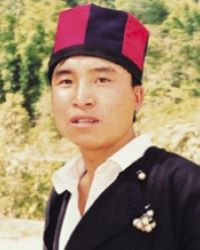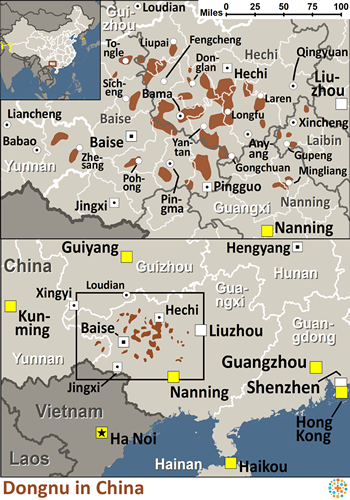The Dongnu live in an ethnically complex region. For centuries they have interacted with people from other minority groups such as the Yao, Miao, and Zhuang. The official classification of the Dongnu is complicated. Dongnu is one of 12 distinct ethnolinguistic groups within the Bunu group. The Bunu, however, were not granted status as one of China's official minorities but were included as part of the Yao nationality, even though they are comprised of many different ethnic groups and languages. Even most of the Bunu groups, including the Dongnu, do not consider themselves related to other Bunu groups such as the Numao, Baonuo, Wunai, and Younou. Because the Chinese government has effectively hidden these people groups, few outsiders know they exist. The Dongnu have never before appeared in any Christian mission lists.
Dongnu women usually give birth in a hut that has been constructed away from the house. They save the placenta and bury it in a safe place in the forest. The Dongnu believe that when people die they will need to have their placenta in order for their ancestors to recognize them.
The religious belief system of the Dongnu contains elements of animism, Daoism and ancestor worship. Ancestors are worshiped down to the fourth generation. It is primarily the job of the oldest son to take care of the ancestral altar.
The Dongnu are without a single known church or Christian believer. Their ethnic, geographic, and linguistic isolation has caused a barrier to the introduction of the gospel. Most mission work in Guangxi prior to 1949 focused on the southern part of the province. Few outsiders have even heard of the Dongnu people. The Dongnu are one of the largest people groups in China without a single known Christian in their midst.
Without the guidance of Christ, these people will be lost in this life and the life to come. They need someone to go to them as Christ-bearers.
Pray for the Lord to intervene in their families, calling people to his side.
Pray for loving, anointed workers.
Pray for their hearts to be drawn to the Lord of lords.
Pray for a church planting movement to thrive in their communities.
Scripture Prayers for the Dongnu in China.
Operation China, Asia Harvest, Copyrighted © Used with permission
| Profile Source: Joshua Project |

























